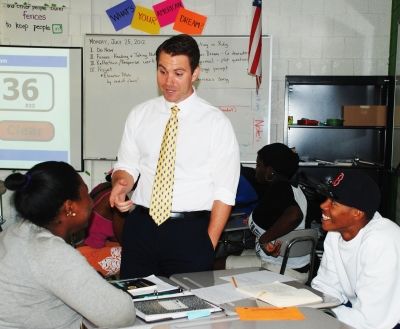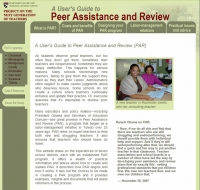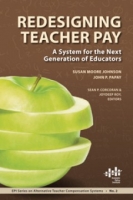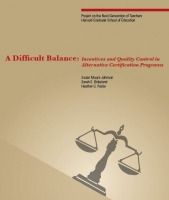 Research clearly shows that the quality of teachers is the most important school-level factor affecting students' learning
Research clearly shows that the quality of teachers is the most important school-level factor affecting students' learning
Since 1998, researchers at The Project on the Next Generation of Teachers at Harvard University have studied efforts to attract, support, and retain skilled and committed teachers for all students in U.S. public schools. Initially, we focused on new teachers, themselves. We asked about their goals, preferences, practices, and career decisions. We found that these novices were indeed members of a new and different generation of professionals. As a cohort, they were more likely than their predecessors to treat teaching as a short-term career and to be dissatisfied with the conditions of their work—its professional isolation, standardized pay, uniform roles, and lack of opportunity for leadership and advancement.
We also learned that teachers’ satisfaction depends largely on the school context where they work, especially whether it supports them in achieving success with their students. If it does not, they may well transfer to another school or leave teaching altogether. Schools that reliably retain teachers have similar features—a principal who manages the school fairly and effectively, skilled colleagues who collaborate regularly, and an organizational culture that supports students, ensures order, and instills respect for learning. When we compared schools serving demographically similar communities, we found that students learned more in schools that teachers rated positively. It turns out that the workplace matters, not only for teachers, but also for students.
Our research and findings are designed to be of practical use to policymakers, practitioners, and researchers. This website describes our research agenda and how it developed over the past two decades. It introduces members of our research team and their current work. It highlights the major themes of our research and, for each topic, includes citations and links to relevant articles, working papers, books, and a supplementary website.
Where Teachers Thrive: Organizing Schools for Success 

Susan Moore Johnson
In Where Teachers Thrive, Susan Moore Johnson, Director of the Project on the Next Generation of Teachers at Harvard, argues convincingly that schools must support teachers’ best work if they are to provide a first-rate education for all students. Based on rich case studies in fourteen high-poverty, urban schools, Where Teachers Thrive examines why some schools failed to make progress, while others achieved remarkable results. It explores the challenges that administrators and teachers faced and describes what worked, what didn’t work, and why. It explains how educators within a school can join together to adopt systems of practice that ensure growth and success by all teachers and their students.
Where Teachers Thrive is available from Harvard Education Press
EXTRA!
The User's Guide: Where Teachers Thrive can be downloaded here: http://bit.ly/2nbX5d7
Teachers, administrators, policymakers, parents, instructors, and researchers will find questions, activities, and suggestions for reflection, discussion, action and further research:
<embed>Praise for Where Teachers Thrive
Susan Moore Johnson makes a profound contribution to the development of the teaching profession at the very time it is most needed. The agenda for school success and achieving equity is now before us. — Michael Fullan, professor emeritus and former dean, University of Toronto, Ontario Institute for Studies in Education
In this exceptional book, Susan Moore Johnson urges readers to strengthen the features of teachers’ work environments that shape their ability to succeed with students. Where Teachers Thrive should be required reading for decision makers who care about deep and lasting educational improvement. — Randi Weingarten, president, American Federation of Teachers
Where Teachers Thrive presents compelling evidence that efforts to recruit and retain knowledgeable and dedicated teachers will likely fail unless they are coupled to a strategic focus on the schools in which teachers work. — Judith Warren Little, Carol Liu Professor of Education Policy, emerita, University of California, Berkeley
In this important and timely book, Susan Moore Johnson argues that professional working conditions are the key to teachers thriving professionally. School leaders must foster an organizational culture that multiplies the impact of every teacher on student achievement. Johnson’s book points the way. — Kim Marshall, editor, Marshall Memo
Recent Publications and Working Papers
- . 2019. “Making a Match: How Successful High-Poverty Schools Hire Teachers.” EdWorking Papers.
- . 2017. “Investing in Development: Six High-Performing Schools Implement the Massachusetts Teacher Evaluation Policy.” Educational Evaluation and Policy Analysis , 39, 3, Pp. 383-406.
- . 2017. “Gauging Goodness of Fit: Teachers' Assessments of Their Instructional Teams.” American Journal of Education, 123, Pp. 383-406.
- . 2015. “Educating Amid Uncertainty: The Organizational Supports Teachers Need to Serve Students in High-Poverty Schools.” Educational Administration Quarterly, 51, 5, Pp. 753-790.
- . 2015. “Teacher Turnover in High-Poverty Schools: What We Know and Can Do.” Teachers College Record, 117, 3, Pp. 1-36.
Books, Monographs, and a Website
A USER'S GUIDE TO PEER ASSISTANCE AND REVIEW
 A website based on the experiences of seven local districts with Peer Assistance and Review. By Susan Moore Johnson, Sarah E. Fiarman, Mindy Sick Munger, John P. Papay, and Emily Kalejs Qazilbash. Visit website here.
A website based on the experiences of seven local districts with Peer Assistance and Review. By Susan Moore Johnson, Sarah E. Fiarman, Mindy Sick Munger, John P. Papay, and Emily Kalejs Qazilbash. Visit website here.
REDESIGNING TEACHER PAY: A SYSTEM FOR THE NEXT GENERATION OF EDUCATORS
 This book analyzes performance-based pay plans and proposes a plan for a career-based compensation system. By Susan Moore Johnson and John P. Papay, published by the Economic Policy Institute. Visit the website here.
This book analyzes performance-based pay plans and proposes a plan for a career-based compensation system. By Susan Moore Johnson and John P. Papay, published by the Economic Policy Institute. Visit the website here.
FINDERS AND KEEPERS: HELPING NEW TEACHERS SURVIVE AND THRIVE IN OUR SCHOOLS
 By Susan Moore Johnson and The Project on the Next Generation of Teachers. Winner of the 2005 American Association of Colleges for Teacher Education's (AACTE) Outstanding Writing Award for a Book.
By Susan Moore Johnson and The Project on the Next Generation of Teachers. Winner of the 2005 American Association of Colleges for Teacher Education's (AACTE) Outstanding Writing Award for a Book.
WHO STAYS IN TEACHING AND WHY: A REVIEW OF THE LITERATURE ON TEACHER RETENTION
 S. M. Johnson, J. H. Berg, & M. L. Donaldson, January 2005.
S. M. Johnson, J. H. Berg, & M. L. Donaldson, January 2005.
A DIFFICULT BALANCE: INCENTIVES AND QUALITY CONTROL IN ALTERNATIVE CERTIFICATION PROGRAMS
 by Susan Moore Johnson, Sarah E. Birkeland, Heather G. Peske, with Mindy Sick Munger, September 2005.
by Susan Moore Johnson, Sarah E. Birkeland, Heather G. Peske, with Mindy Sick Munger, September 2005.
Most Frequently Cited Publications
- . 2003. “Pursuing a 'Sense of Success': New Teachers Explain their Career Decisions.” American Educational Research Journal, 40, 3, Pp. 581-617.
- . 2004. Finders and Keepers: Helping New Teachers Survive and Thrive in Our Schools. Jossey-Bass.
- . 2005. Who Stays in Teaching and Why: A Review of the Literature on Teacher Retention. NRTA's Educator Support Network.
- . 2012. “How Context Matters in High-Need Schools: The Effects of Teachers’ Working Conditions on their Professional Satisfaction and their Students' Achievement.” Teachers College Record, 114, 10, Pp. 1-39. Full Text Online
- . 2001. “Counting on Colleagues: New Teachers Encounter the Professional Cultures of their Schools.” Educational Administration Quarterly, 37, 2, Pp. 250-290. Abstract, Sage PublicationsAbstract
- . 2007. “On Their Own and Presumed Expert: New Teachers' Experiences with Their Colleagues.” Teachers College Record, 109, 12. TRC Link
- . 2015. “Teacher Turnover in High-Poverty Schools: What We Know and Can Do.” Teachers College Record, 117, 3, Pp. 1-36.
